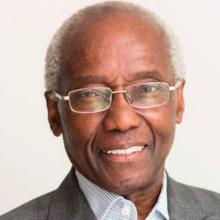
Forth Street-based Edinburgh & Lothians Regional Equality Council is hosting a lecture by Sir Geoffrey Palmer OBE (right) on 17 December in St Augustine's Church.
The talk will offer new perspectives on Scotland's involvement in the Slave Trade, something with which Broughton was once intimately involved (see Breaking news, 15.11.13).
It's an important and long overdue acknowledgement of Scots' complicity in the Slave Trade, and for this reason we're happy to reproduce ELREC's explanatory introduction below. Tickets cost £5 and can be booked HERE.
Professor Palmer's lecture will be illustrated showing new information linked to this slavery. It will also describe how the Act of the Union of 1707 gave Scots the incentive to use this slavery, in Caribbean Islands such as Jamaica, to make Scotland and themselves rich.
Scots became slave masters, slave owners and governors. In addition, Scottish doctors, surveyors, lawyers, joiners and many in the military made fortunes maintaining this slavery until it was abolished in 1838.
Products from this slavery such as tobacco, coffee, sugar and cotton built the Scottish economy. Coarse linen, made in Scotland, made clothes for slaves.
Professor Palmer will relate this history, which is now receiving great attention, in his own style of interlinking different areas of this important history. He will link this history from Scottish surnames in Caribbean telephone books to the names of well known Scots such as Henry Dundas, William Gladstone’s father, Sir John Gladstone, Robert Cunninghame Graham, Robert Bogle, Evan Baillie, Richard Oswald, James Buchanan, Earl Balcarres, Sir Archibald Grant, James Ewing, the Stirlings of Keir, the Wedderburns and Lord Henry Brougham.
Finally, Professor Palmer will show that although this historical link between Scotland and Slavery cannot be changed, Glasgow University’s recent statement that it will use reparative justice to mitigate the consequences of a slavery from which it benefited financially is an act of goodness which others should follow.
The talk will be followed by a question-and-answer session.